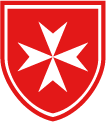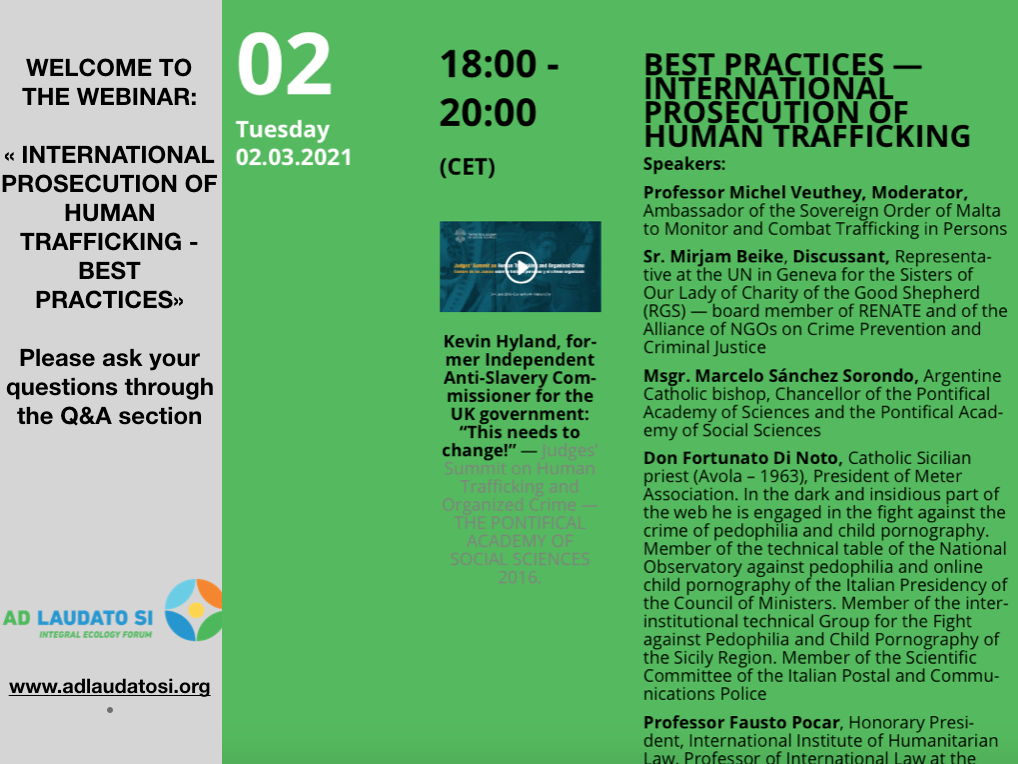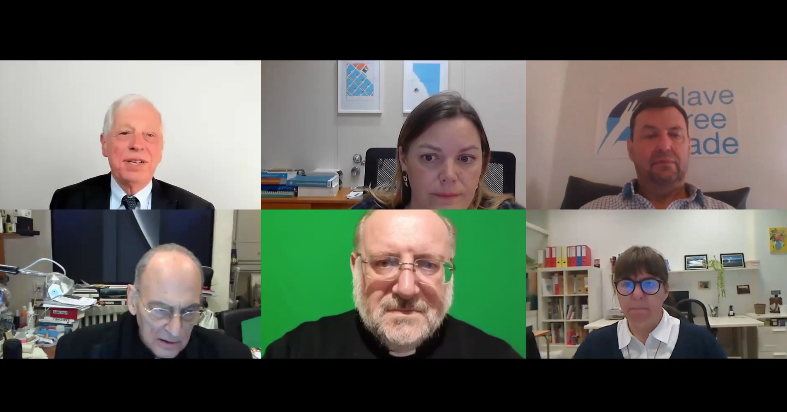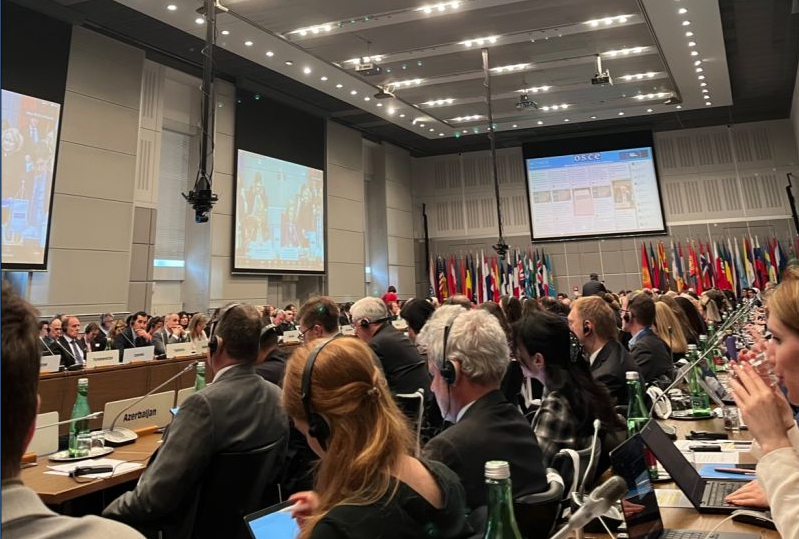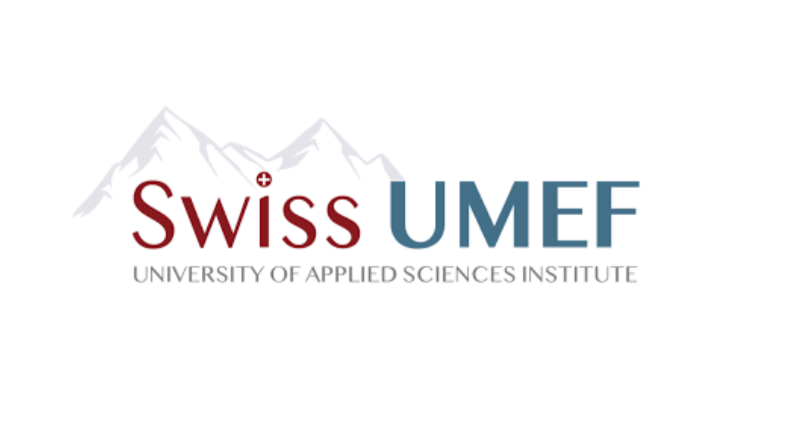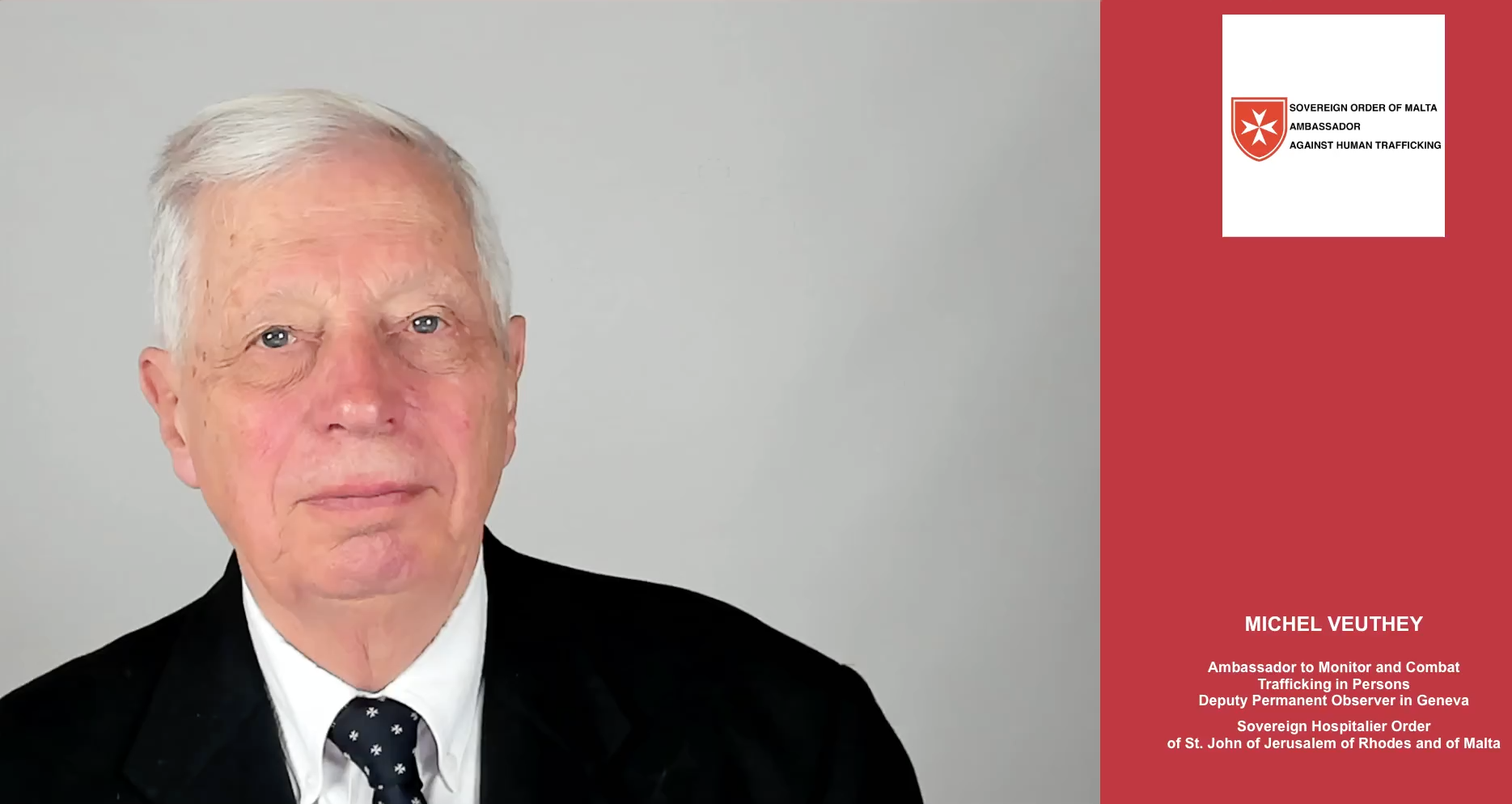Your are welcome to watch our third On-Demand Video Webinar on “International Prosecution Of Human Trafficking — Best Practices”.
The Ambassador of the Order of Malta to monitor and combat trafficking in persons organizes a series of 3 webinars on the international prosecution of human trafficking. This series of 3 webinars will assess the implementation of this treaty, raise awareness on the need to effectively prosecute traffickers, and promote action at the international, regional and national levels.
This webinar is the third of a series of three webinars :
Where are we now?
What can be done?
Best Practices
This webinar did focus on best practices with a few very skilled and experienced presenters on this complex subject.
The webinar highlighted Holy See’s position given by Mgr Marcelo Sánchez Sorondo, the difficulties of prosecutions, the need of transparency in the supply chain as well as the urgency to act for stopping the abuse of young children through the web which affects more than 16 millions children in Europe only…!
A recording is available: Link to the vdeo

Ambassador Michel Veuthey OM, Morgane Nicot UNODC, Brian Iselin Slave Free Trade, Mgr. Marcelo Sánchez Sorondo, Don Fortunato Di Noto Meter Association, Sr. Mirjam Beike Sisters of Our Lady of Charity of the Good Shepherd, discussing together this important theme of human trafficking.
Speakers:
Professor Michel Veuthey, Moderator, Ambassador of the Sovereign Order of Malta to Monitor and Combat Trafficking in Persons
Sr. Mirjam Beike, Discussant, Representative at the UN in Geneva for the Sisters of Our Lady of Charity of the Good Shepherd (RGS) — board member of RENATE and of the Alliance of NGOs on Crime Prevention and Criminal Justice
Msgr. Marcelo Sánchez Sorondo, Argentine Catholic bishop, Chancellor of the Pontifical Academy of Sciences and the Pontifical Academy of Social Sciences
Don Fortunato Di Noto, Catholic Sicilian priest (Avola – 1963), President of Meter Association. In the dark and insidious part of the web he is engaged in the fight against the crime of pedophilia and child pornography. Member of the technical table of the National Observatory against pedophilia and online child pornography of the Italian Presidency of the Council of Ministers. Member of the inter-institutional technical Group for the Fight against Pedophilia and Child Pornography of the Sicily Region. Member of the Scientific Committee of the Italian Postal and Communications Police
Professor Fausto Pocar, Honorary President, International Institute of Humanitarian Law, Professor of International Law at the Law Faculty of the University of Milan. Judge of the International Criminal Tribunal for the former Yugoslavia (ICTY) in The Hague, President of the Tribunal from 2005 to 2008. Judge of the Appeals Chamber of the International Criminal Tribunal for Rwanda (ICTR). In 2017, Pocar was appointed Judge ad hoc of the International Court of Justice (ICJ) in the case between Ukraine and the Russian Federation
Morgane Nicot,UNODC Criminal Justice Officer, Team Leader, Knowledge Development / Human Trafficking & Migrant Smuggling
John McCarthy QC, Chair of the Sydney Catholic Archdiocese Anti-Slavery Taskforce Executive Team, Australian Ambassador to the Holy See from 2012 to 2016. Prior to his ambassadorial appointment, he was a Queens Counsel at the NSW Bar and a barrister in Sydney
Brian Iselin, former Australian soldier and federal agent, Founder of Geneva-based Slave Free Trade, a nonprofit working on leveraging the might of the blockchain to rid the world of slave labor
This third webinar explores some of the best practices in combating human trafficking, and how they can be shared and applied by judges and other stakeholders including civil society.
Msgr. Marcelo Sánchez Sorondo
After the appeal of Pope Francis in 2015 to the Pontifical Academy of Social Sciences to combat human trafficking and the new forms of slavery, the Academy arrived to two conclusions which Msgr. Sorondo develops in his speech. Firstly, there ought to be a clearer definition of human trafficking, and positive law instruments that defend and promote the dignity of the human body: the human body cannot be commercialized in any way. Secondly, there has to be effective systems to assist the victims in their recovery and reintegration in society. Importantly, Msgr. Sorondo highlights the fact that human trafficking must be considered a crime against humanity.
Prof. Fausto Pocar
Already in 2000 Prof. Pocar’s position was that human trafficking is a crime against humanity. Nevertheless, human trafficking is not stated as an international crime, but it is considered an ordinary crime. In the light of this, Prof. Pocar stresses the need for a clear definition of human trafficking at the international level. He appeals to the International Criminal Court to take on a case of human trafficking because a decision from this Court would have an international echo that might subsequently change the law.
Prof. Pocar highlights the specific character of the Universal Declaration of Human Rights, where universality means that these principles are applicable through time. Hence, Prof. Pocar says that we need to clarify the crime of HT, in order to safeguard the rights of future generations.
Morgane Nicot
Three times more women are represented in the convictions for human trafficking than in other forms of crimes, as is stated in the UNODC 2020 Global Report on Trafficking in Persons . Morgan Nicot proposes an interpretation of this fact through the presentation of the case law analysis Female Victims of Trafficking for Sexual Exploitation as Defendants (December, 2020). In this report, Morgane Nicot and her team analyzed cases where women victims of trafficking were in fact prosecuted for trafficking. The reports shows that a number of victims of trafficking are forced to participate in criminal activities, and that this is used as a strategy by the traffickers to not get arrested.
These cases stresses the importance of victim identification prior to prosecution, as States have positive obligations to protect potential victims of trafficking, and also to identify them upon detection. Hence, Morgane Nicot shows how the decision to prosecute potential victims of trafficking, while not prohibited per se in international law, may be at odds with State’s duty to take operational measures to protect victims of trafficking.
Brian Iselin
Brian Iselin urges us to take a look at the actual problem of human trafficking and modern slavery: the problem confronting us is someone who makes the moral and economic choice to exploit someone else. Our current economic model does not incentivize business to stop exploiting workers because there is no business advantage to treat people better.
Through the work of his organization SlaveFreeTrade, Brian Iselin proposes to tackle the problem of human trafficking by addressing business men and women, and trying to make them want to change their practices. By making the human rights performances linked to the bottom line of the company, there is an incentive to change the practices towards decent workplaces. SlaveFreeTrade proposes a real time assessment of the company’s workplaces to evaluate their human rights performances in real time, following the 10 Principles for Decent Work they developed. As Brian Iselin says: “if you have a workplace of people you should be human right compliant. You shouldn’t be in business if you’re not”.
